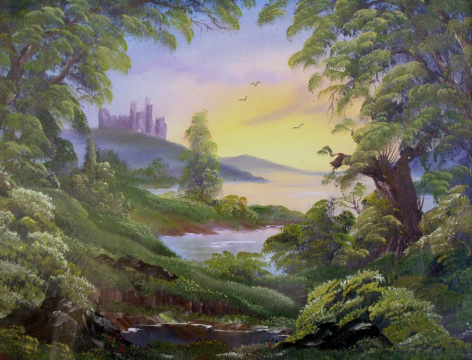Fantasy and the problem with Tolkien
I’m going to offer a different slant on Sue Vincent’s blog Fantasy and the Problem with Tolkien (spoiler alert: she doesn’t see one), and I hope you think about both. Whether you’re a reader or writer.
I stumbled across the Lord of the Rings in 1969, stuffed on the back shelf of the libraries science fiction section. I spent a month reading it (I was a sophomore in high school.) At the time, only one other student in my school had read it, a geeky redhead named Peter Polhemus who was really into those Avlon Hill war games with the dice and big grids. At the time fantasy didn’t model Tolkein and I read more eagerly. But at the time, novelists didn’t shoot for trilogies and quadrilogies and septlogies. They wrote books, and if they turned into a series, they didn’t try to put a number on them.
Two things happened. I aspired to other books that captured characters as vividly as Tolkeins. Someone introduced me to Lewis and the Perelandra series, and from there I picked up the Lion, the With and the Wardrobe.
But I also found Vonnegut, Philip Roth, Anthony Burgess, Orwell, Keasey, Huxley and even the pulp of Robert Howard. I realized it isn’t the formula that drives a narrative (unless I wanted to knock out a book overnight because I was stoned and bored, Monty Python wasn’t showing nightly and Texas PBS didn’t broadcast Doctor Who because he was a fop.)
That’s when they started cranking out the trilogies and then octologies. And every one bored me to tears. Why? Because I knew exactly what would happen. The hero would travel to a new land with strange creatures and a new language the author just knew I needed to learn because people in other dimensions don’t talk like us, and have different customs (although they all wore medieval clothes, bore medieval weapons and the world was littered with exotic animals). By the time I was forty I had to explain to my son why I didn’t want to read another fantasy series he recommended because a hero is a stalker instead of a hunter isn’t really different. I could tell him the plot of his series before he told me: New world, hero(ine) who doesn’t know he/she’s the chosen one, magic talisman, new vocabulary, arch villain trying to take control, band of allies, quest, other species the hero must meet (and us too).
When I would sit in writing circles I fell asleep as soon as someone opened their story with “Falderin adjusted his breeches and listened for the hooting of the horned wart owl.” I would struggle to find something kind to say, but I couldn’t. I could only say, “Write something you haven’t read sixty times already.”
So why did Harry Potter work when so many failed? Because Rowling created compelling characters. The formula ranked second.
Tolkein ultimately led me to a love of literature that led me to Thomas Pynchon, Flannery O’Connor, Walker Percy, Saul Bellow, Doris Lessing.
Doris Lessing. She wrote sci fi/fantasy that broke the mold. Her Canopos in Argos series still occupies a place on my shelf even though I couldn’t make it through the first two hundred pages of Lord of the Rings the last time I tried to read it.
You see, I realized I’d outgrown Tolkein after three readings. Like Lewis, the language and characters never conveyed emotion and depth like their contemporaries Lessing, Iris Murdoch and Joh Fowles.
So why do I still celebrate the Lord of the Rings? Because it was a gateway to truly great literature for a (literally) sophomoric 10th-grade mind. But sooner or later we must push the envelope of our reading, just as Frodo pushed the envelope of his courage. When others turned back to their comfort zones, he and Samwise pushed deeper and deeper into the heart of darkness, into unfamiliar territory, into realms that called upon them to use every resource they had.
We should follow their example.
 Painting: Sue Vincent
Painting: Sue Vincent
It has to be said that Tolkien causes problems. Quite apart from being so addictive that, once read, you are likely to go back and read the books again, you may never find anywhere quite as rich as Middle Earth within the pages of another book.
Anyone whose introduction to fantasy is via The Hobbit and Lord of the Rings, will have a fabulously detailed, multi-layered and multicultural world permanently established in their imagination. Especially if you go on to read The Silmarillion too and become aware of the rich complexity and authenticity of the languages, histories and mythologies he created as the backdrop for his world. Tolkien’s elves, orcs and wizards will quickly become the standard by which all others are judged. The sheer scope of the story means that just about every possible trope is used, and every mythical or magical species is covered…
View original post 745 more words


Wind Eggs
As much as I admire Plato I think the wind eggs exploded in his face and that art and literature have more to tell us, because of their emotional content, than the dry desert winds of philosophy alone. ...more
- Phillip T. Stephens's profile
- 31 followers




